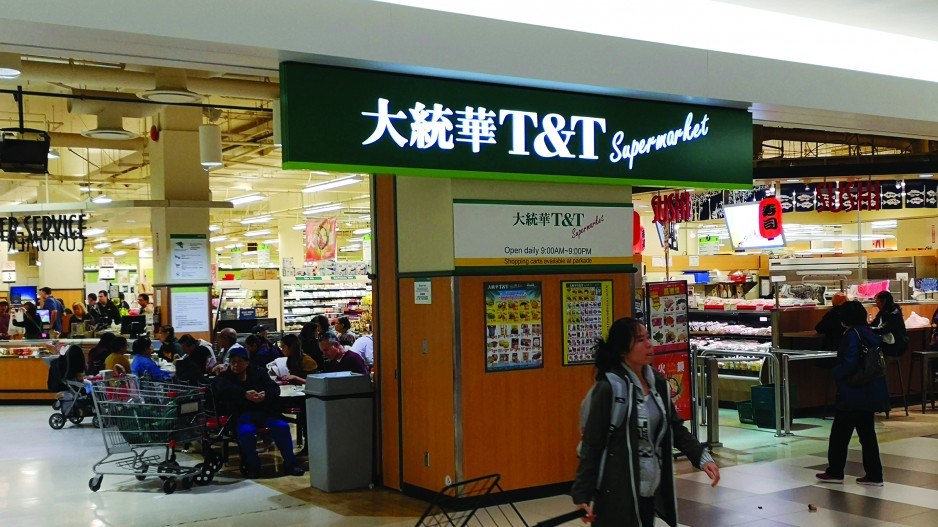Despite a growing chill between China and the West on a wide range of geopolitical and economic issues, the uptake for North American businesses looking to install payment systems linked to Chinese giants Alipay and WeChat Pay has not cooled.
The latest store to join the Alipay and WeChat Pay mobile payment networks, through a deal with Richmond-based service provider AlphaPay, is the increasingly ubiquitous T&T Supermarket chain (owned by Toronto-based Loblaw Cos. [TSX:L]), which announced this month its 27 locations across Canada will now accept transactions based on the Chinese mobile-payment platforms.
Michael Wong, vice-president of business development at Alpha Pay, said the discussion has been ongoing since May 2018 and was finalized in principle in February, although AlphaPay had to work closely with T&T to integrate the point-of-sale systems into each store, which pushed the official announcement to this month.
“That was when the real work began, because there was still a lot of technology that we had to place at the individual cashiers,” Wong said. “Every merchant uses different software, so we need to collaborate with them to figure out how to best add our technology to their business systems.”
Beyond T&T, operations showing interest in AlphaPay’s technology include private schools, travel agencies, airlines, telecommunication service providers and even provincial health authorities. All are looking at the potential of letting consumers use Alipay or WeChat Pay to pay their bills or buy goods and services using their home bank accounts – something that Chinese consumers do on a daily basis as mobile payment has almost completely displaced cash and credit cards.
The announcement coincides with Golden Week, China’s National Day holiday season when Chinese consumers spend more money domestically and abroad. According to Ant Financial (the Alibaba Group (NYSE:BABA) subsidiary that runs Alipay), consumers on the platform pushed transaction volume up 10% versus last year at the same time, with a 15% increase in spending per user (US$351).
The top non-Chinese markets for Alipay transaction volume include Japan, Thailand, South Korea, Malaysia, Australia, Singapore and the Philippines, Ant Financial said. Meanwhile, Chinese media outlet Caixin Global reported that China’s cross-border e-commerce transaction volume is expected to hit US$1.24 trillion by 2020 – indicating a rising demand by Chinese consumers for cross-border payment systems.
Part of the reason for the rise may be Beijing’s limits on citizens’ ability to withdraw money from their Chinese bank accounts while overseas. There have been a number of limits in recent years, the latest of which was introduced in 2018 when China added an annual US$15,000 cap on people withdrawing money from their accounts while abroad.
E-payment systems like Alipay and WeChat Pay (as well as China’s own UnionPay credit cards), however, bypass those limits.
The AlphaPay system works for consumers with a Chinese bank account linked to either Alipay or WeChat Pay. QR code scanners have now been installed at T&T locations, where consumers can present a code to the cashier to be scanned. The scan releases funds directly from the consumer’s bank account.
While there has been some concern that the recent cooling of Ottawa-Beijing relations could reduce the number of travellers visiting Canada from China, Wong said he isn’t concerned, since a large number of Chinese consumers with Alipay or WeChat Pay already live in Metro Vancouver at least part time.
He added that the other major market segment AlphaPay is targeting with its technology is international students, who want the convenience of using their payment systems at home in their new study environments.
“We are focusing on the immigrant population … because many of them still have problems accessing their funds,” Wong said. “So this is a great tool for them to use to allocate their funds for daily purchases. And for the international students, to get wire transfers under the limits … having this option would allow them to spend.”
In a statement, T&T CEO Tina Lee reiterated Wong’s point, noting the move allows the store to focus on customers “both local and visiting.”
For AlphaPay, the T&T announcement may just be the beginning of a big year. The Richmond-based company said it was able to secure a U.S. business licence recently and will explore opening an American office in the upcoming months. The main target markets in the United States, Wong said, will likely be regions with large Chinese immigrant populations or international student bases such as New York and California.
The other major shift eyed by AlphaPay, Wong said, will be one towards data analytics. He noted that as more consumers use AlphaPay platforms to access Alipay and WeChat Pay, the company can gather more user data to customize marketing plans for individual consumers.




